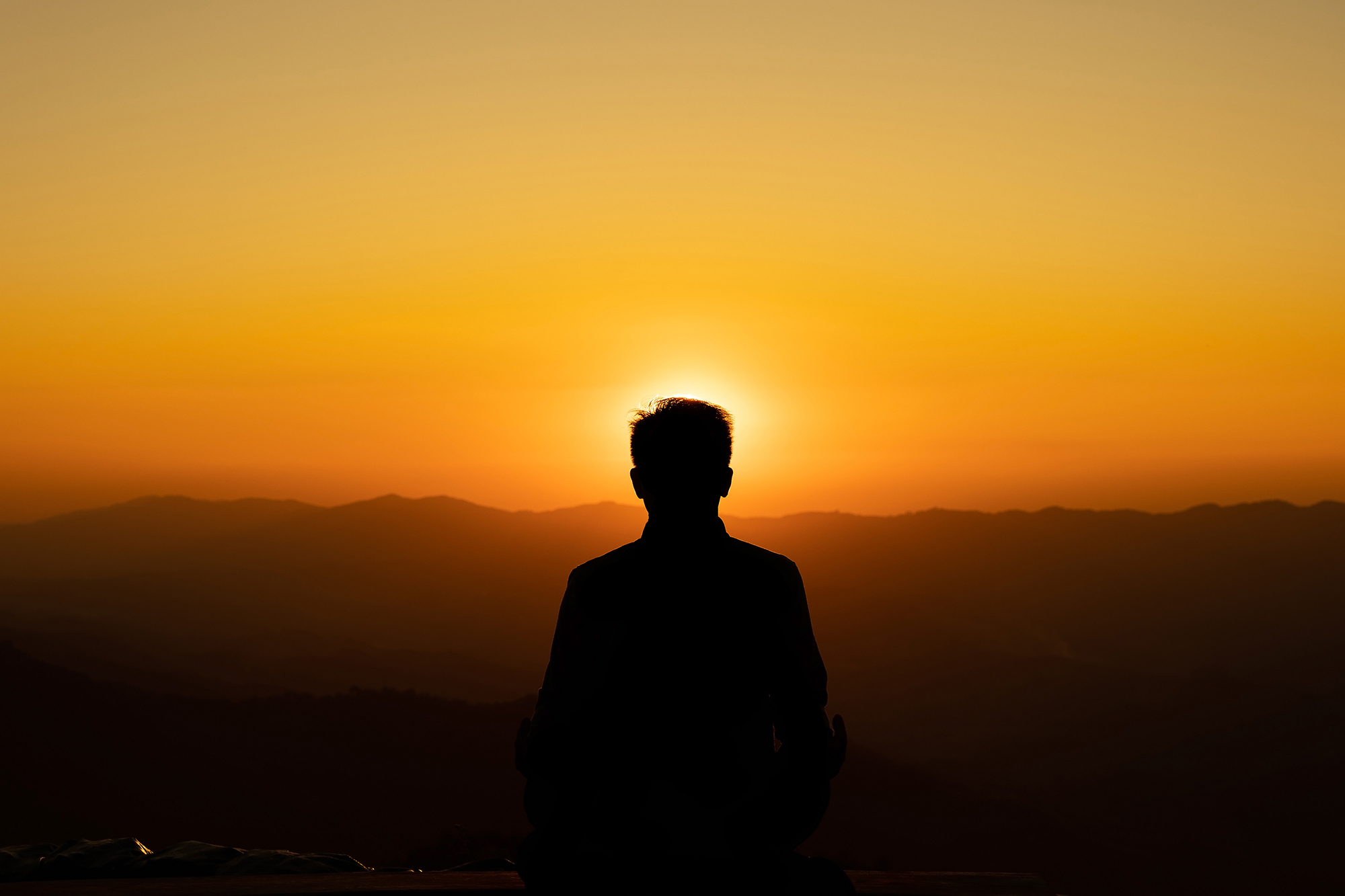Does man enjoy freedom of action or are all the events of human life predetermined by invisible laws over which he has no control? Can man shape his destiny or is he a puppet in the hands of fate?
Every action has an equal reaction
Every man is the master of his own destiny. He himself has shaped the life he is living. As we sow, so shall we reap! Man is free to act but the consequences of his actions are predetermined by immutable cosmic laws. If one’s actions are positive and supportive to life, one reaps the reward of those actions, which produce an increase of joy and satisfaction in life. Whereas if one’s actions are negative and damaging to life, then the consequences of such actions will be an increase of sorrow and dissatisfaction in life. Every action has an equal reaction. The universe responds to the actions of the individual. The consequence of every action corresponds to the quality of the action, and the quality of the action depends on the mind, the feelings, and the consciousness of the actor. One cannot escape the consequences of one’s actions. Similarly, an arrow, once released, cannot be withdrawn.
The universe is governed by cosmic laws. There are innumerable laws which create, maintain and govern the universe. It is impossible for any human being to know intellectually all the laws operating at every strata of creation. Therefore, one cannot intellectually apprehend the full range of repercussions caused by every action one performs. Since most actions are neither totally positive nor totally negative, the effects accruing from those actions will be mixed.
The universe may be described as a living breathing organism, composed of trillions of web-like interconnections which constantly interact and influence each other. Because the universe is intricately interwoven, every thought, word and action of every individual influences the fabric of life as a whole. Every word we speak vibrates in the air. The vibration sends forth waves that produce corresponding vibrations which spread into the atmosphere. The influence of every thought, word and action on the universe as a whole is incomprehensible. The full effect cannot be measured. In this sense, karma or action is unfathomable.
Free-will expands as consciousness expands
The free-will of the past determines the quality of the present, and the free-will of the present shapes the quality of the future. The individual is free to reap what he has sown. If he has planted apples, in time, the apple seeds will sprout and bear fruit. If he has sown mangoes, in time, the mangoes will ripen. The fruit of every action always corresponds to the action itself; and the action corresponds to the quality of consciousness of the actor.

If the consciousness of the actor is stronger, purer, his actions will spontaneously be more in harmony with cosmic law. A stronger mind has broader comprehension. Therefore, the range of possibilities open to the actor will be greater and the actor will be able to choose those actions which will be of maximum benefit to him and the environment. Whereas if the consciousness of the actor is weak due to stress, tension or fatigue, then the actor will be unable to choose those actions which will be of maximum value to himself and the environment. Due to the boundaries of his own awareness, the actor will be, as if forced, to make choices which are contrary to his own well-being and which may produce a damaging influence on the environment. Such actions, which violate the cosmic laws governing the universe, will inevitably produce strain in the actor and tension in the atmosphere and a subsequent increase of sorrow and suffering in the life of the individual.
As human awareness evolves, free-will expands. A human being, who is living the full potential of the human mind, enjoys a state of life in perpetual freedom in which all possibilities are a living reality of daily life.
Mechanics of action
Let us examine the mechanics of action in the state of bondage and in the state of full development of consciousness, the state of enlightenment. The basis of action is desire. Desire arises from a feeling of want. When we feel a lack of something, we act to fulfill our desire. All actions create impressions in the mind. When the mind-body is more stressed and tense, the impressions of our experiences on the mind can be compared to etching deep grooves in a stone. Our actions leave very deep impressions on the mind which takes a long time to erase. These mental impressions of past experiences are the seeds of the desires which lead to future actions. The past impression comes to the surface of the mind again as a desire and action follows. The present action again produces a deep impression which again leads to a desire for gain when favorable conditions become available. For this reason, the actor often finds himself making the same mistakes over and over again. The cycle of action-impression-desire keeps a man bound to the field of action. When the consciousness of the actor is weak, the mind is overshadowed by the objects of the senses. The actor is bound to the field of action. The objects of the senses capture the mind and thus the actor acts from the state of bondage.
Maharishi Mahesh Yogi, in his commentary on the Bhagavad Gita, says:
“Bondage certainly lies in the field of action, but it is not born of action: it is born of the weakness of the actor. When a small businessman incurs a loss, his mind is profoundly affected by it.”
As human awareness develops to enlightenment, the mind-body becomes more and more flexible and the impressions of experiences do not produce such a binding influence on the actor. The actor is able to enjoy the fruit of his actions while simultaneously remaining established in the state of inner freedom. This state of freedom is based on an unshakable inner contentment which springs from unity with the Higher Self or Atman. An individual established in the bliss of the Higher Self, acts in the world, but the experiences of his actions do not leave impressions deep enough to form the seeds of future desires. The mind of the enlightened may be compared to an ocean and the impressions to waves on the surface of the ocean. The waves come and go but the ocean remains ever-full and undisturbed. The impressions, like the waves, appear and disappear, leaving the mind free to dwell in the present moment, to enjoy to the fullest each new experience that arises. Because the mind is fully expanded and infinitely flexible, it is free from the binding influence of action. One is not attached to the past or the future. One lives in a state of eternal freedom while engaged in dynamic activity. The state of liberation is a state of total fulfillment. There can be no feeling of want. What then stimulates the individual to act if desire, or a sense of need, is the basis of action?

The actions of the individual in the state of enlightenment are in response to the needs of the time. The individual is an innocent instrument of the Divine Will. Having gained the ultimate goal of human life, union with the Higher Self, his life is a life of service.
Maharishi Mahesh Yogi describes such a life:
“…the enlightened man lives a life of fulfillment. His actions, being free from desire, serve only the need of the time. He has no personal interest to gain. He is engaged in fulfilling the cosmic purpose and therefore his actions are guided by nature. This is why he does not have to worry about his needs. His needs are the needs of nature, which takes care of their fulfilment, he being the instrument of the Divine.”
Whether we live the state of eternal freedom or we live in bondage to the field of action, life is as we can have it. The choice is ours. Either we choose to develop the full potential of our mind or we choose to become more and more entangled in the material aspect of life. Each moment of life, wisely spent, can lead us closer to that state of eternal freedom in bliss consciousness which is enlightenment.
Source of quotations: Maharishi Mahesh Yogi, On the Bhagavad Gita, A New Translation and Commentary 1-6, Penguin Books, p.142 (commentary on Ch.2, v.50) and p.287 (commentary on Ch.4, v.22)
 Barbara Ann Briggs is a certified teacher of Transcendental Meditation and the author of two books: The Contribution of Maharishi’s Vedic Science to Complete Fulfilment in Life and Pilgrimage on the Path of Love, a novel of visionary fiction. www.barbaraannbriggs.com
Barbara Ann Briggs is a certified teacher of Transcendental Meditation and the author of two books: The Contribution of Maharishi’s Vedic Science to Complete Fulfilment in Life and Pilgrimage on the Path of Love, a novel of visionary fiction. www.barbaraannbriggs.com




